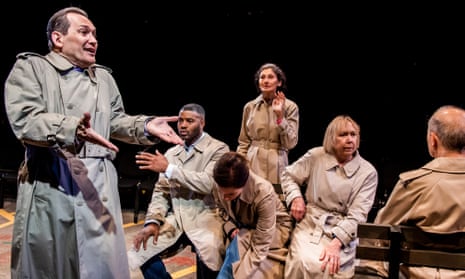‘We have ended up with a very dysfunctional and flawed system.” So said the transport secretary this week speaking of the railways. But if Grant Shapps wonders why things are so bad, he should rush to see this excellent revival of David Hare’s 2003 documentary play, which reminds us that it was the bungled privatisation of the railways 10 years earlier under John Major’s government that produced the mess we have today.
Plays about politics are often said to date quickly. This one endures because it is sharply informative and profoundly moving. What is extraordinary is that many civil servants and senior executives even at the time saw that the Balkanisation of the railways, in which a unified system was broken up into 113 pieces “like beads thrown on to a table”, would lead to disaster. But, having established that the separation of track from trains was a fundamental mistake, the play really hits its stride when it deals with four major crashes – at Southall, Ladbroke Grove, Hatfield and Potters Bar – that happened between 1997 and 2002. Those interviewed register not just their grief but their rage at the cyclical process by which preventable accidents are followed by political hand-wringing and ineffectual inquiries.
The play doesn’t disguise the fact that the survivors and the bereaved often found themselves at loggerheads. What is touching is the impassioned eloquence of those who lost loved ones and their relief that someone is at last listening to them. It is the humanity of the piece that comes through most strongly in Alexander Lass’s production played in a subterranean space where we can hear the rumble of trains overhead.
Everyone in the cast plays many parts, but there are especially striking contributions from Jacqui Dubois, Anna Acton and Gabrielle Lloyd representing the bereaved; from Jonathan Coote as various faces of officialdom; and from Paul Dodds as both union leader and profit-making entrepreneur.
In 2003, I questioned the play’s use of the railways as a metaphor for national chaos. If anything, it now seems to have erred on the side of restraint.

Comments (…)
Sign in or create your Guardian account to join the discussion